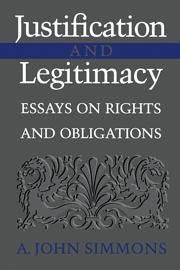Book contents
- Frontmatter
- Contents
- Introduction
- Acknowledgments
- 1 The Principle of Fair Play
- 2 Fair Play and Political Obligation: Twenty Years Later
- 3 The Obligations of Citizens and the Justification of Conscription
- 4 Associative Political Obligations
- 5 External Justifications and Institutional Roles
- 6 Philosophical Anarchism
- 7 Justification and Legitimacy
- 8 “Denisons” and “Aliens”: Locke's Problem of Political Consent
- 9 Human Rights and World Citizenship: The Universality of Human Rights in Kant and Locke
- 10 Original-Acquisition Justifications of Private Property
- 11 Historical Rights and Fair Shares
- 12 Makers' Rights
- Index
3 - The Obligations of Citizens and the Justification of Conscription
Published online by Cambridge University Press: 05 June 2012
- Frontmatter
- Contents
- Introduction
- Acknowledgments
- 1 The Principle of Fair Play
- 2 Fair Play and Political Obligation: Twenty Years Later
- 3 The Obligations of Citizens and the Justification of Conscription
- 4 Associative Political Obligations
- 5 External Justifications and Institutional Roles
- 6 Philosophical Anarchism
- 7 Justification and Legitimacy
- 8 “Denisons” and “Aliens”: Locke's Problem of Political Consent
- 9 Human Rights and World Citizenship: The Universality of Human Rights in Kant and Locke
- 10 Original-Acquisition Justifications of Private Property
- 11 Historical Rights and Fair Shares
- 12 Makers' Rights
- Index
Summary
The Obligation to Serve
Most defenses of the military draft offered in contemporary debates must be understood as having conditional form. When conscription is defended in terms of efficiency (on grounds of cost or the resulting quality of personnel, for instance), the conclusion must be read as incorporating a ceteris paribus clause: if there are no other relevant differences between possible policies, then conscription is preferable (on grounds of efficiency). Similarly, when it is argued that the draft has advantages in terms of fairness (for instance, by distributing burdens more evenly across racial or economic groups), this fact (if indeed it is a fact) has only conditional weight in determining conclusions about the justifiability of the draft. Just as it is possible to pursue efficiently a desirable end by indefensible means, it is possible to distribute burdens fairly that ought not to be distributed at all. An unconditional moral justification or rejection of conscription would deal not only with its efficiency or distributive fairness, but also with more basic moral characteristics of policies of compulsory military service. For example, such policies involve institutionalized forms of coercion, coercion not in response to (or to prevent) transgressions, but in response to birth and continued residence in the territories of the state. And because the efficiency and fairness of coercive interference seem never to legitimate it (a corporate executive may not simply force other persons to work in his plant, no matter how scrupulously he selects them), appeals to efficiency and fairness in defending the draft may seem pointless.
- Type
- Chapter
- Information
- Justification and LegitimacyEssays on Rights and Obligations, pp. 43 - 64Publisher: Cambridge University PressPrint publication year: 2000



